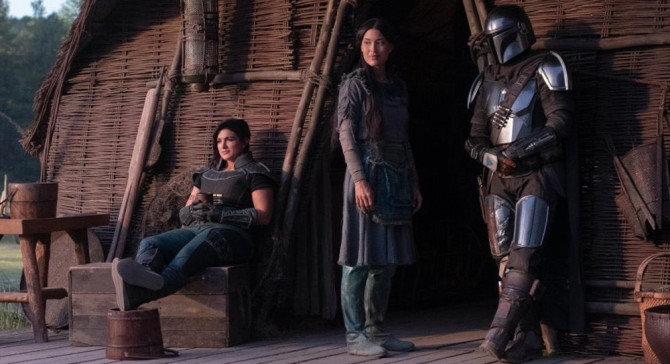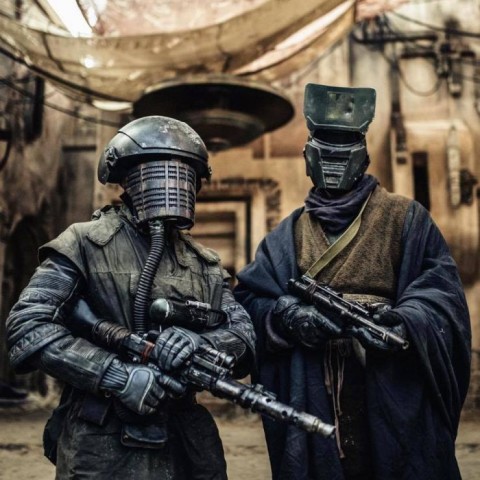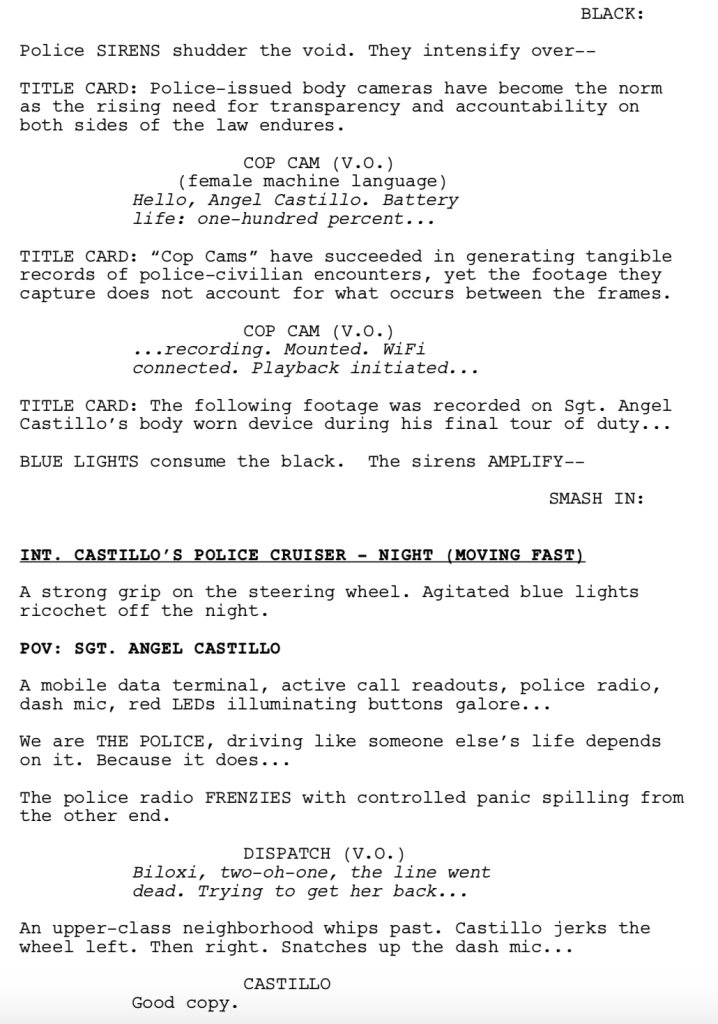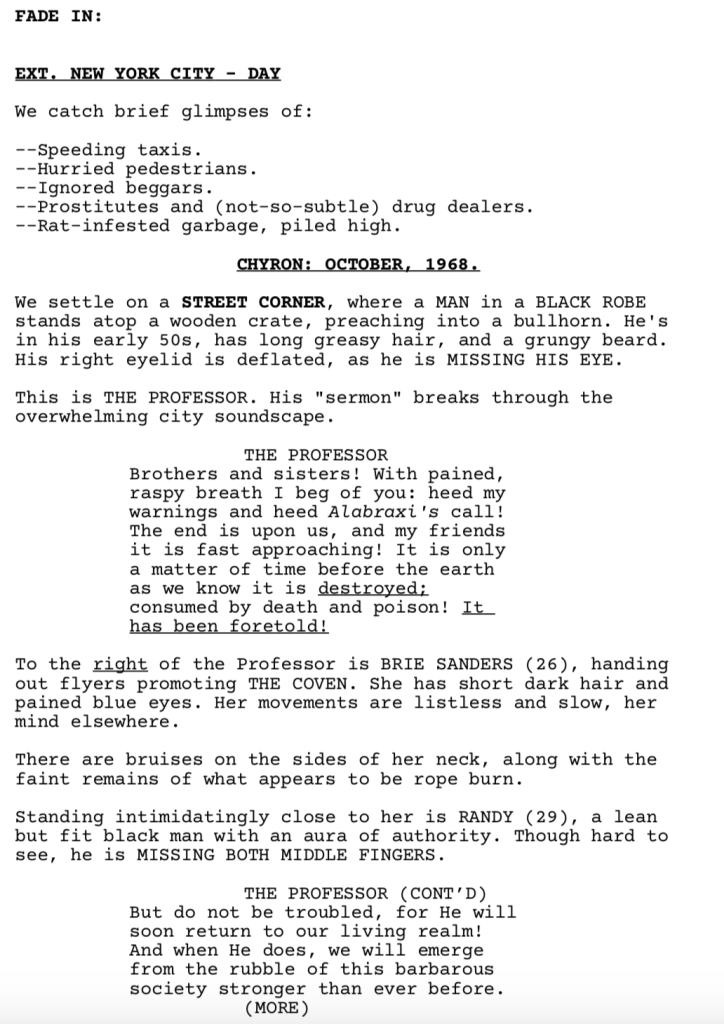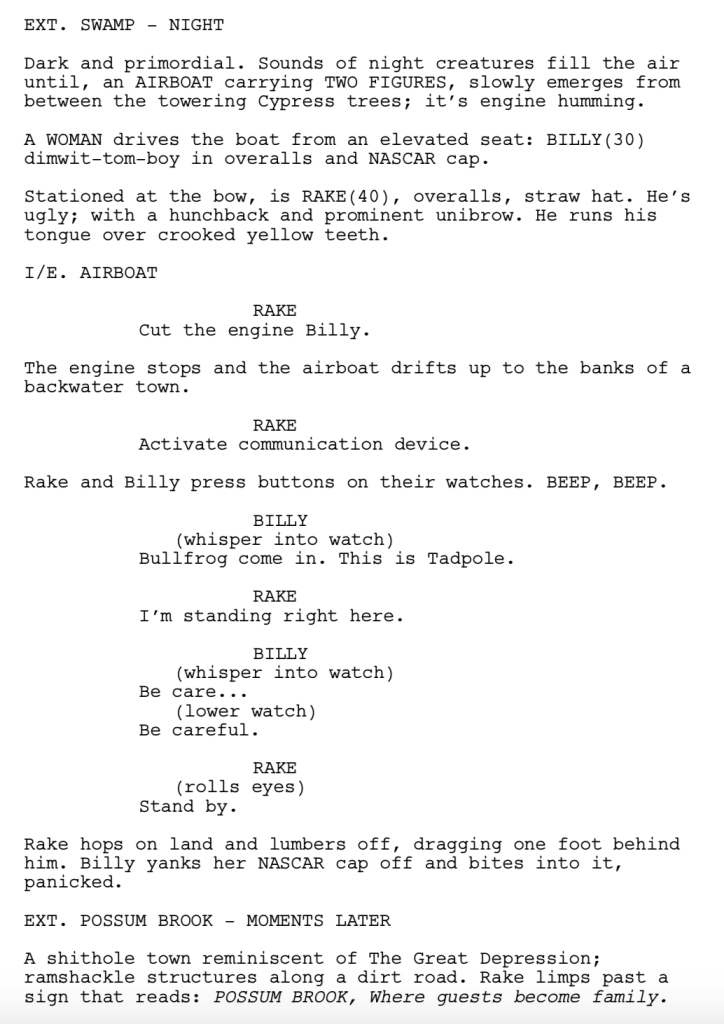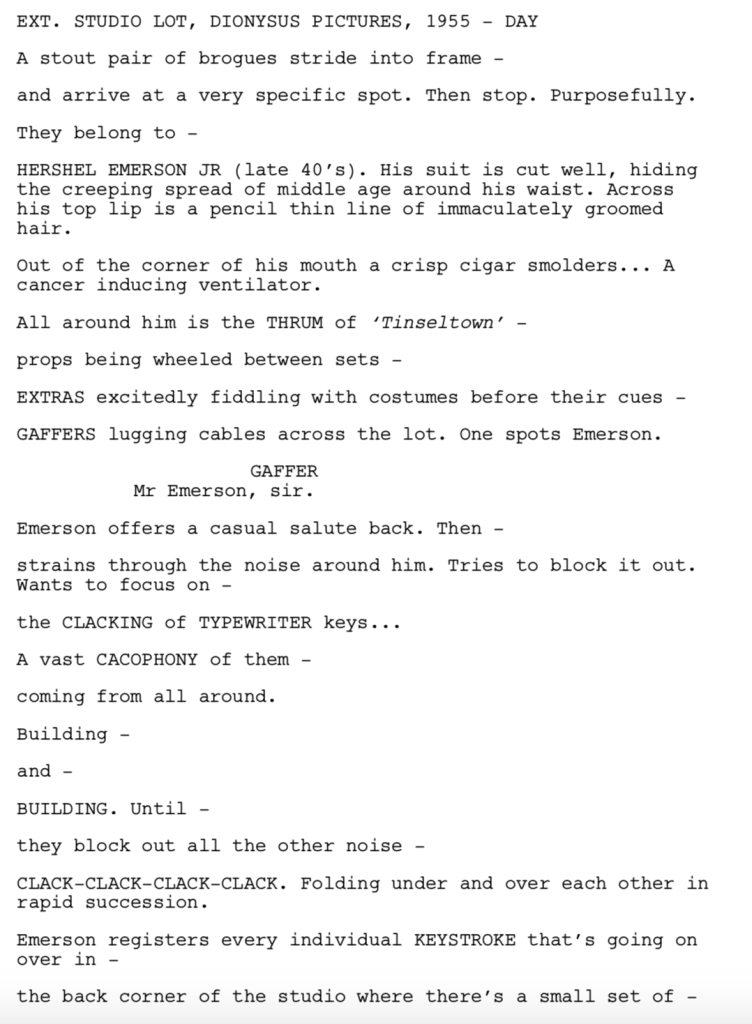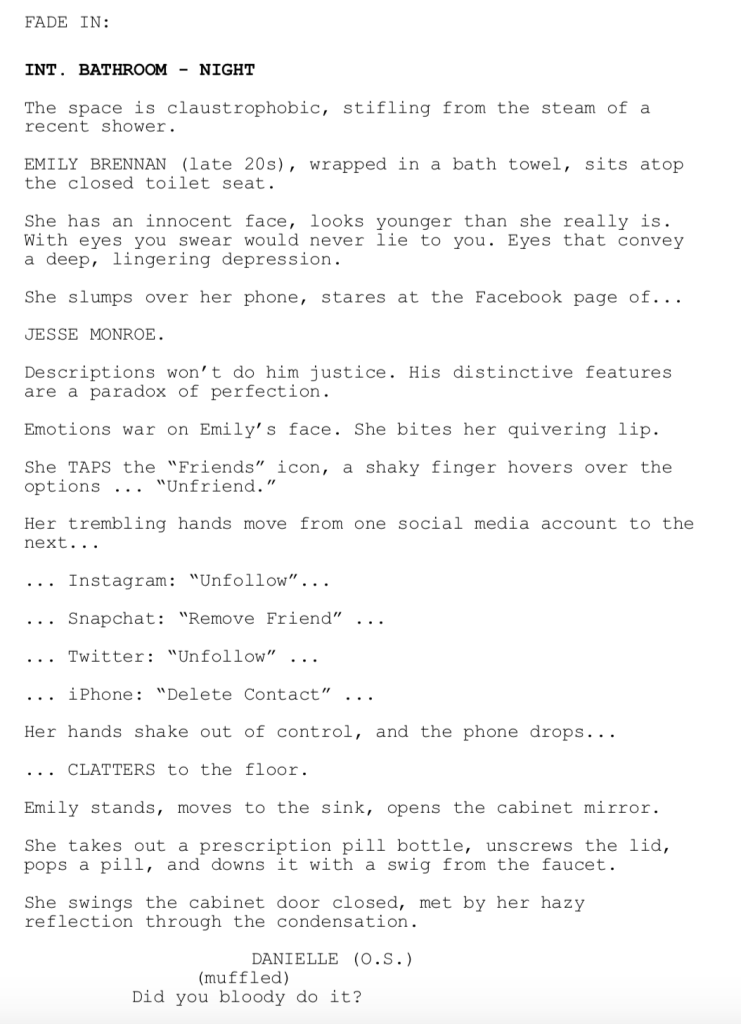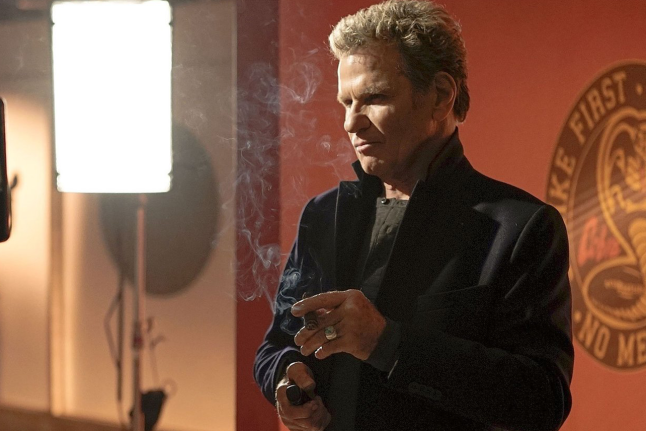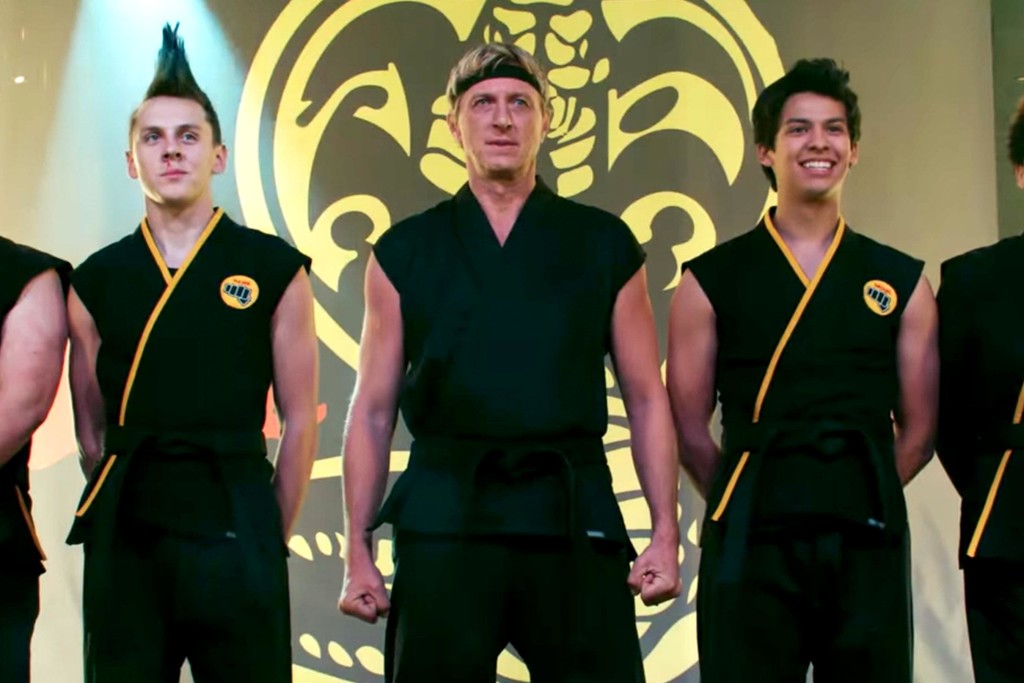Search Results for: mena
Genre: Horror
Premise: When an overstressed young woman joins her best friend at a wellness retreat in the Arizona desert, she begins to suspect that the revitalizing spa treatments, serums, and macrobiotic meals are part of something closer to a dangerous cult, run by the retreat’s charismatic leader.
About: This script finished on this year’s Blood List! Co-writers Kevin Aarmento and Jaki Bradley are just getting started in their careers. Jaki directed a small film called Last Ferry this year.
Writers: Kevin Armento & Jaki Bradley
Details: 103 pages
I wondered for years why they didn’t make more horror movies about cults. Cults are freaky, man! Not to mention, there’s so much you can do with the mythology since each cult’s backstory is unique. With Midsommer coming out earlier this year and a few other cult horror scripts floating around, cult horror is becoming a thing.
And that’s not the only script similarity we’re seeing today. Remember how yesterday’s script was about a group of people brought to a remote place who are then manipulated by a psychotic antagonist? That’s the same setup for today’s script. And that’s not a bad thing. This is a format that works well in features. As long as you come up with your own unique characters with their own unique backstories as well as a unique setting, you can get a ton of mileage out of this setup.
Let us take a look at Detox’s plot.
Sam is a 30-something consumer safety officer for the FDA. Her daily existence has been boring ever since her husband killed himself. That’s why her best friend, Madison, has set up an amazing opportunity for them to go to one of the most prestigious wellness centers for women in the entire world.
The two head out to the middle of Arizona and meet up with all the rest of the participants, women of varying ages who are doing extremely well in life but who are blocked in some way by personal setbacks. Soon we learn that Sam’s personal setback is more complicated than we were told. The reason her husband killed himself is because Sam had a miscarriage and blamed her for it.
Things get weird immediately. This center is all about detoxifying and that means they only get to eat a single plant for the first 48 hours of the weeklong excursion. But, in the meantime, they’re allowed to drink juices and elixirs, most of which make them feel woozy and wacked out. Sam is constantly seeing things, like her dead husband in the corner of a room, only to wake up in her bedroom and wonder if it was just a dream.
But the visions are nothing compared to some of the practices they use here. At one point they lock Sam in a negative 300 degree cryotherapy chamber and won’t let her out until she explains in detail how losing her husband made her feel. And in another group exercise, one of the staff members “channels” Sam’s dead husband, forcing Sam to have a conversation with “him,” an exchange “her husband” ends by screaming at her, “I hate you! I hate you!”
Eventually, Sam begins to suspect that Willa, the leader, is up to something, so she sneaks into her office, steals her phone back, and starts googling the names of everyone here. What she finds is far from encouraging. Pictures of some of the staff members hanging out with some of the participants years ago. This leads Sam to realize that maybe the person who brought her here, Madison, is also in on whatever’s going on. Or is it all part of the plan to help Sam finally detoxify her past and start living again?
Look. This script was pretty good.
But here’s something I want all screenwriters to consider because I don’t think the average screenwriter considers this. There’s a very good chance that a reader or a producer or an agent read another script similar to yours recently. That’s because none of are as original as we think we are. There are only so many story situations to pull from.
For this reason, you have to ask yourself if this is the best execution of your idea that you’re capable of. Because if I just read a script yesterday with a similar setup and it’s better than yours, then all I’m going to think of your script is that it’s the “not as good” version of the two scripts in question.
This is why holding yourself to such a high standard is crucial in screenwriting. You can’t get by with “fine.” You’re constantly being compared to other scripts and other writers that readers just read last month, last week, even last Saturday. Every plot choice you make, you have to ask yourself, “Is this really the best I can do?” And if it is, great. But if there’s some doubt in your mind, try to come up with something better. You’d be surprised at how creative you can actually be when you push yourself.
I do give the writers credit, however, for two things. First, they committed to their protagonist’s makeup. What I mean by that is, they could’ve easily lip-serviced the whole miscarriage thing. Draw it onto the character to give her that “depth” screenwriting books always talk about. But they go all in with it. The exercises at the retreat force Sam to dig deep into what happened, not only with the miscarriage itself, but how it destroyed her marriage.
That’s what you want to do in these movies. You don’t want to send your character off to a scary wellness retreat and then throw a bunch of jump scares at her and call it a day. Wellness centers are about exorcising demons and facing your past so you should be marrying that situation to your character’s inner journey.
The other thing is that the second half of this script was a lot stronger than the first half. Which was nice to see since it’s usually the opposite. Writing a script is hard. It takes a lot out of you. And you often see that in the back half of a script. The writer runs out of gas, leading each scene to be less interesting than the previous scene. Your script should always be building. It should always be getting better. And where you usually find that extra gear is in rewrites.
I can tell you the exact moment in this script where it hit that higher gear. Sam sees the picture of one of the staff members hanging out on a beach with one of the participants (from two years ago). It doesn’t make any sense. And Madison, her friend, came here last year. So she’s already vouched for this place. So it wasn’t an obvious scam where they were all putting on a show because then her best friend would have to be in on it. And that didn’t make sense. That turned the second half into a compelling mystery, that so happened to make the main character a lot more active (active characters can be gear-changers all on their own – if your story feels slow in any way, consider ramping up how active your main character is).
One last thing I want to praise the writers for is that everybody in town right now is writing female lead roles. Even if it doesn’t make sense, they do it because they know that’s what studios want. As a result, you get a lot of unnatural scenarios that feel like Ghostbusters 2016. But everything about this all-female setup feels authentic. We never question why there isn’t a single male character in the movie. And that’s the way it should be. You want to create scenarios that are organic for your characters regardless of the genre.
So I say this is worth the read. It just has the unfortunate luck of coming right after The Menu.
[ ] What the hell did I just read?
[ ] wasn’t for me
[x] worth the read
[ ] impressive
[ ] genius
What I learned: Competitive Writing. – When you’re writing a script, imagine someone else writing a script which isn’t that different from yours. Because that’s happening. There will be many writers THIS YEAR who are writing screenplays similar to your own. For this reason, you want to recruit your competitive side. Imagine that other writer (or writers) writing the scene you’re writing next and be competitive about it. Write a scene that you believe is clearly better than any of the scenes any of those other writers could come up with. Writing is such a singular experience that we often forget how much our writing is being compared with others. As a reader, I can confirm that this comparison is going on. So call on that inner athlete of yours to out-write whoever the competition is.
What I learned 2: You get one “hero sees freaky thing then wakes up and wonders if it was a dream” moment in a script. MAYBE TWO, at most. But you should avoid these scenes if possible. The problem with them is that it allows the writer to cheat. They get to show something freaky and then not have to explain it. And the more you do that to the reader, the more they feel f$%#d with. So go crazy with one of these if you must. But please stop at one.
There have been a lot of people championing the arrival of live-action Star Wars in the TV format, including myself (The Mandalorian arrives next Tuesday!). A large contingent of Star Wars fans are frustrated with where the films have gone and their hope is that TV will infuse Star Wars with fresh energy. In particular, it will allow them to flesh out characters and build some real depth into the universe.
However, there’s a potential pitfall awaiting The Mandalorian that I’ve been worried about ever since a TV show was announced. It has a connection to the Scriptshadow triumvirate, our famous three-ingredient rule for screenwriting success – GSU. GSU stands for goal, stakes, and urgency and it’s the last letter in the acronym we should be concerned about. Because what a lot of people don’t realize is that Star Wars is heavily dependent on URGENCY.
Take a look at the first Star Wars – A New Hope. That film is pure urgency. It starts with a giant ship chasing a tiny ship. Two droids escape from that ship and the chase is on for the bad guys to capture them. Even as Luke and Obi-Wan are chilling in his bungalow, Darth Vader is fast closing in, determined to find the droids. And once our heroes end up at the Death Star, the urgency is ramped up ten-fold.
Empire Strikes Back takes a similar approach with Darth Vader on a relentless pursuit to find Luke Skywalker. And Return of the Jedi keeps the urgency at the forefront with the Rebels determined to take down the new Death Star before it becomes operational.
There are many problems with the prequels but the one that gets overlooked is the lack of urgency. I would argue it’s the primary reason why those films didn’t live up to the Star Wars name. There was some attempt at urgency in Phantom Menace with the threat of war on Naboo looming. But it went out the window when the characters got stuck on Tatooine, and later, Coruscant, seemingly with all the time in the world.
Attack of the Clones was the biggest offender, sending two of its characters, Anakin and Padme, to a planet where they could run around in fields and tell each other they loved each other for what seemed like years. I barely remember Episode 3, but from what I do remember, we have a time jump in the film. There should never ever be a time jump in a Star Wars film. It is the definition of non-urgent if you can take four months off in the middle of a story.
Then came Force Awakens. What was the defining storytelling component in that film? It was urgency. The script moved incredibly fast. I would argue too fast. But it’s not a surprise that that film was liked by so many. It brought back the key ingredient to successful Star Wars movies. Rogue One had some sense of urgency but not a lot. That may be why it’s seen as an average Star Wars film. And while Last Jedi had a ticking time bomb with the First Order chasing a Resistance ship, it was offset by the fact that it was a (purposefully) slow chase.
To summarize, the four most successful Star Wars movies (Star Wars, Empire, Jedi, and Force Awakens) all put a major emphasis on URGENCY, which is proof to me that urgency is an ingredient necessary to make Star Wars work. Which brings us to The Mandalorian TV show. TV shows are NOT about urgency. They can’t be. They don’t have the budget to continuously keep everyone moving. This is why so many scenes in TV shows are characters talking in rooms. The budget necessitates it.
Characters in a room is fine when the characters are great, when there’s an adequate amount of conflict, when the writers are utilizing subtext (there’s the scene we’re seeing and the scene that’s happening underneath the scene), when characters are faced with hard choices that go against their makeup, when characters are working through a problem with major consequences attached.
HOWEVER…
Is that Star Wars?
One of the major things that separates features from TV shows is urgency. Go watch any of your favorite movies. Because movies must conclude, there’s usually a force pushing the characters towards that conclusion. That force creates a sense of urgency. But TV shows don’t need to conclude. So any force is far off in the distance. There are ways to combat this, of course. You can create more immediate goals that keep your characters active in the present episode (“Go visit Krybor on the planet of Fizzlestrom. But hurry, he’s on his death bed.”). But, again, inevitably, TV has to put people in rooms talking without any urgency. And we’ve never seen Star Wars under these conditions.
There’s a bigger discussion to be had here that you’re probably picking up on. Features favor urgency. TV favors character development. But I believe that urgency helps EVERY story, regardless of format. If they had the money, more TV shows would try and inject urgency into their storylines. And there’s some that have. I didn’t watch 24 but I think every episode of that show had extreme urgency, right? That was part of its hook?
One of the reasons hospital shows do so well is there’s a built-in urgency to the formula. There’s always somebody coming through the ER who’s just been hit by a bus and will lose their face if Dr. Johnson doesn’t figure out a way to save it before the hour’s over. But even those shows can’t keep it up all the time. Go back and watch episodes of ER and you see tons of doctors sitting around talking about things.
You also have to understand how to implant urgency into a story. There are two factors to getting this right. The first is setting up the scenario. “If we don’t re-attach the patient’s face within the next hour, his body will reject it.” But the second is SELLING the scenario. If you set up the time-constraint but then no one mentions that they’re running out of time the rest of the episode, we’re not going to feel the urgency. This was the mistake Rian Johnson made in Last Jedi. Technically, the Resistance was running out of time. The First Order ship was going to catch them. But because the chase was literally in slow-motion, we never felt that urgency on the screen.
Now there are hacks you can use to trick the audience into feeling urgency during slow moments. For example, you can use something called “sandwiching” whereby you sandwich a slow scene in between an urgent storyline. I’ll use Star Wars as an example. You would show the Empire closing in on the droids before cutting to Luke and Obi-Wan having a talk about Luke’s father in Obi-Wan’s hut. There’s a tense undercurrent in us while we watch this scene because we just saw that the Empire is closing in the droids, and, by association, Luke and Obi-Wan. We know we’re getting closer to a conclusion on that pursuit, which makes us more willing to watch a slow scene.
But there are only so many hacks and tricks you can use before you’re putting people in rooms talking about their feelings, their pasts, other people, and philosophies – all stuff that can bring the entertainment level to a halt if the character writing isn’t up to par. And that’s what we’re going to find out next Tuesday. Can Star Wars exist under this new set of rules? It’s never been able to do it before. But who knows? Maybe the low-episode count allows them to build some urgency into the overall plot. Or maybe they have the money to keep the pace at a feature level.
But this remains my biggest concern going into the show. Is how they’re going to compensate for losing something that’s a core part of Star Wars’s DNA. We’ll find out next Tuesday when I talk about this and ALL the other writing choices made in the first episode of The Mandalorian!
It’s going to be Monday Madness when I review Hobbs & Shaw and determine the question that’s been eating at us for over a decade. Is it possible to make a good Fast and Furious movie without Vin Diesel? They’ve tried before and the results were disappointing. Could the rumor be true? That Dominic saying “family” once every five minutes is the only way these movies work? I’m eager to find out. I’m also eager to see what happens when you make a Fast and Furious movie a sci-fi flick, since apparently that’s where the franchise is headed.
Good news this week as participation does not require any dancing.
If you haven’t played Amateur Showdown before, it’s a cut throat single weekend screenplay tournament where the scripts have been vetted from a pile of hundreds to be featured here, for your entertainment. It’s up to you to read as much of each script as you can, then vote for your favorite in the comments section. Whoever receives the most votes by Sunday 11:59pm Pacific Time gets a review next Friday. If you’d like to submit your own script to compete in a future Amateur Showdown, send a PDF of your script to carsonreeves3@gmail.com with the title, genre, logline, and why you think your script should get a shot.
Note: Accessing scripts should be a lot easier this week as I’m using Google Drive. :)
To all who have entered this weekend’s contest, I wish you…. GOOD LUCK!
Title: Cop Cam
Genre: Found footage/Crime-thriller
Logline: Told through the lens of a police-worn body camera, a retiring cop with a baby on the way faces the most harrowing shift of his career after a traffic stop devolves into a violent mess affecting both sides of the law.
Why You Should Read: I’ve always thought a found-footage film involving a cop’s body camera would be an interesting concept to explore. Police-worn body camera footage persists as some of the most controversial, yet fascinating forms of real-time-media in existence today. Think about it, when’s the last time you didn’t click on a “contains graphic content” police video that was shared to social media? The footage always tells a story, but rarely captures the facts in their entirety. As a police lieutenant, I watch countless hours of body cam footage from the officers under my watch and am rarely ever bored. On the contrary, they typically inspire movie ideas for my scripts. For “Cop Cam”, I wanted to infuse elements from some of the most disturbing videos I’ve encountered into a grounded, found-footage crime-thriller told from the first-person perspective of one cop’s final day on duty. While most found footage films deal in supernatural horror, I aimed to bend the genre here into purely thriller territory, although a lot of feedback has mentioned it certainly flirts with horror. The script just received positive coverage from WeScreenplay: “This high-octane, action-packed thrill ride is a rip-roaring page-turner told with unflinching authenticity. The amount of story, twists, and turns in this tight script is a strong showing of narrative economy. A cops and robbers caper that unfolds like a beautiful car wreck with a continually worsening state of affairs that’s likely to appeal to mass audiences. This is one flat out cool movie.”
Title: Coven
Genre: Psychological Horror
Logline: When a homeless teenage girl becomes the newest member of an acid-popping doomsday cult known as The Coven, a long-dispirited member makes it her mission to escape with the young girl before she falls under the spell of The Professor, their abusive yet charismatic leader.
Why You Should Read: Like many screenwriting hopefuls, I submitted some scripts to the Nicholls this year, hoping that one of them may be the script that changes everything. Unfortunately, this year was not my year. Nevertheless, “Coven” finished in the top 10% – a personal best and a sign that my work is improving year after year. While I impatiently wait for the reader comments, I figured it would be awesome to get some feedback from the community that arguably taught me the most about the art of screenwriting.
“Coven” is my stab at one of my favorite horror sub-genres: the cult film. It’s a weird, violent, psychedelic, slow-burn story with a heavy emotional core, featuring a strong female lead who works to escape the trauma of her past and the physical (and psychological) prison she’s found herself in. And to sweeten the pot, about 90% of the film takes place in one location, so it can made on a shoe-string budget (I’m looking at you, Blumhouse!).
Many thanks to anyone who gives this a read; whether it’s the whole thing or just a few pages, any and all feedback is greatly appreciated! And a special thanks to Carson for holding a forum where a nobody like me can get their work in front of so many smart and talented people. Looking forward to hearing what you guys and gals have to say!
Title: MYSTERY MAN
Genre: Action Comedy
Logline: America’s favorite mystery author returns home for his father’s funeral and reluctantly teams up with his crazy sister who believes their father was murdered.
Why You Should Read: The inspiration for “Mystery Man” was derived from a love for whodunnits and my wacky home state of Florida. With twists and turns that will keep you guessing to the very end, “Mystery Man” is raunchy at times, heartfelt at others, and always weird. “Mystery Man” was a semifinalist in both the 2017 Stage 32 Annual Comedy Contest and Screencraft’s Annual Comedy Contest. It also placed second in Final Draft’s Annual Big Break Contest (2017) in the comedy category. Subsequently, “Mystery Man” was optioned for a year. The option recently expired so it’s now back on the market!
Title: INK
Genre: Noir
Logline: When screenwriter Don Miller goes missing from the lot of Dionysus Pictures, toon actor Chester Charles is sent to try and discover where he is, but soon finds himself shoulder deep in the greatest conspiracy that Tinseltown has to offer.
Why You Should Read: My last script WONDERLAND was featured here on Scriptshadow and I received some really great feedback from the community. One of the big notes was that people wanted to see me play in my own sandbox rather than build on someone else’s work… So, I created one… A conspiracy thriller set in an alternative 1950’s Hollywood where the moguls that run the place are willing to turn to nefarious means to keep their stars in order (both human and toon), their wallets fat and the ‘Red Menace’ at bay. INK marries the Disney Conspiracies with Who Framed Roger Rabbit and adds a smattering of observations about the manipulative power of the media.
Title: BROKENHEARTED
Genre: anti-rom-com
Logline: In a misguided attempt to mend her broken heart, a lovelorn twentysomething decides to pursue a casual, no-emotions-attached fling with a womanizing stranger from Tinder.
Why You Should Read: Greetings! An older draft of this script won the Austin Film Festival Drama Screenplay Competition in 2017. Prior to the festival win, I secured a manager who found me on Blcklst after Brokenhearted received that magic number 8 (amongst some 7s and 5s.) The script got me general meetings at a few reputable production companies and one big studio (Naming names feels tacky.) I had the opportunity to pitch on an open assignment. (Crashed and burned obviously.) Brokenhearted has always been a divisive script, and with the encouragement of my manager, I did a massive rewrite of the script alongside a credited director. The rewrite involved structural changes, supporting character gender swaps, and massive “killing of darlings,” particularly chatty banter dialogue sequences. The new (and improved?) draft landed just outside the Top 5% (Quarterfinals) of the Nicholl Fellowship. I received the dreaded “some good news: your script just missed advancing, placing among the next 100 scripts after the 365 quarterfinalists” email. Aside from reads from the director, my manager, and a few writer friends, I haven’t really put this script out there for public scrutiny. Nicholl 2019 was the first real litmus test. I’ve written, re-written, read, and re-read this thing so many times that I’m completely emotionally detached. The re-write was a rewarding experience, one I feel produced a stronger draft. But my eyes stayed dry. I can’t help but wonder: has the script lost its soul? I’ll admit to being a bit of a lurker here on ScriptShadow for about the last year. As someone who has been active in the screenwriting community and contest circuit since 2014, I don’t know why it took me so long to join the party. (That’s a lie. It’s because I’m an INFJ.) And that was a long-ass “why you should read.” I promise the screenplay has a ton of white space. Thank you for your consideration!
Genre: TV – Drama
Premise: When former Cobra Kai boss John Kreese moves back into town, he challenges Johnny to take his students to the next level.
About: This is Season 2 of Cobra Kai, the Youtube Premium sensation that became the most unexpected hit of last season. The pilot episode was viewed by over 60 million people. The show dropped its second season last Wednesday, giving people something to do while they waited for Avengers to open. But can the sequel possibly be as good as the original?
Creators: Josh Heald & Jon Hurwitz & Hayden Schlossberg (based on the screenplay, “The Karate Kid” by Robert Mark Kamen)
Details: 10 episodes
I have been waiting for this for the ENTIRE YEAR. Can I please get some Daniel LaRusso with a side of crane kick THANK YOU!
In this newest season of Cobra Kai, the evil John Kreese, the former owner of Cobra Kai and Johnny’s old sensei (the one who infamously told him to “sweep the leg” in that final fight), has come back to town with an eye on rejoining Cobra Kai. Johnny has conflicted feelings about it. Kreese was like a father figure to him. But in many ways, Kreese derailed his life. After giving it some thought, he allows Kreese in as an observer.
Meanwhile, Daniel LaRusso allows Robby (who’s Johnny’s son, remember) to stay at his house. He also starts a little Miagi dojo in the backyard for Robby and Daniel’s daughter, Sam, to get their karate on. And maybe, when Daniel isn’t around, some smooching. That’s right, the chemistry between these two is through the roof. But does Sam still have feelings for Miguel, even though he’s turned to the dark side and become Cobra Kai’s top student?
Kreese strategically works his way back into the Cobra Kai fold. First he’s observing classes, then offering tips, then teaching classes! Kreese is all about “no mercy,” which confuses Johnny’s students, since he’s always taught them that mercy is essential to being a great warrior. Needless to say, something’s going to pop here. And when it does, the Cobra Kai dojo and all of its students will never be the same.
You really get a sense of whether showrunners know what they’re doing in the second season. The first season is always the easiest to map out. Five hours of television is basically one long movie. So you can map out some sort of goal and move all your charaters towards it. Cobra Kai Season 1 uses the state karate tournament as its season goal. And that’s a big reason why the season worked. It had a clear vision of where the storyline was going.
The dirty secret about Season 2 is that most writers have never experienced it before. Almost all pilots that are shot never make it to air. And those that do make it rarely get to a second season. So whenever someone wins the lottery of having their show get to that elusive season 2, they’re in uncharted waters. They’ve never had to worry about this scenario before, so they make it up as they go along.
The one thing they do know is that television is about character. So they end up putting all the focus on character development. And while this is, of course, good, and while this medium is perfect for that approach, if you put all of your focus on character and none of it on plot, your audience is going to start wondering what we’re doing here. Why are we spending so much time with these characters if we don’t know where they’re going?
Cobra Kai’s creators said they weren’t going to do a tournament every season. And they shouldn’t. It would get too predictable. But that doesn’t mean you’re absolved of having any direction to your story. I was a good six episodes into Cobra Kai Season 2 and while I continued to enjoy the characters, there’s no doubt that the missing ingredient was momentum. And that was due to the fact that there was very little plotting.
Outside of a “sort-of there but not really” plot about Daniel starting his own dojo, the main plotting device used in this season is John Creese. Now this is a very important distinction so I want you to pay attention. There are two types of plotting devices you can use. One is to have your characters charge forward and bring the story with them (Rocky Balboa training for the heavyweight title of the world). Two is to throw something at your characters and see how they react. I call this the “disruptor” element. It’s self-explanatory. You throw something at your characters that disrupts them. John Creese is the disruptor. He comes in to shake up the Cobra Kai dojo.
You’ll use both of these plotting devices throughout a TV show. And while it’s certainly possible to only use the disruptor element, it’s dangerous. Because a disruptor merely makes your characters react. Ideally, you want your characters to act on their own. You want them making decisions and charging forward and bringing the story with them. And one of the problems with this particular disruption is that John Creese doesn’t pop the way they were hoping.
Unlike Daniel and Johnny, whose lives in 2019 are somewhat believable, it’s hard to buy that this old man has been doing absolutely nothing for 30 years but waiting to get back involved with a tiny karate dojo in the valley. And he’s old enough now where he’s lost a lot of his menace. So we’re not as afraid of him as we once were. Cobra Kai has been good at balancing reality with cheesy 80s movies logic throughout its run. But they may have pushed their luck with Kreese. And since he’s the only semblance of a plot for the entire season, that puts all of the pressure on the characters to carry the load.
The good news for Cobra Kai is that almost all of their characters are likable. I could watch Daniel and Johnny act together all day. His daughter, Sam, and Robby are also great. Miguel remains awesome, even though he didn’t get enough time this season. I loved the new bad girl. And I continue to perk up every time Hawk is in a scene. All you then have to do is place these characters in scenes with an adequate amount of conflict and your show will be relatively entertaining. For example, Miguel is constantly at odds with whether being a part of Cobra Kai is right. This conflict is carried into every conversation he has with Johnny or Hawk or Kreese, all of whom are ride-or-die Cobra Kai.
And then, of course, Cobra Kai’s secret weapon is its karate. When things get boring, it’s time for some karate in the woods, in the bar, or… AT SCHOOL! I’m telling you, that school battle almost single-handedly made up for the lack of plotting all season. At first I thought it was going to be your typical two people have a fight in the middle of the hallway with the rest of the school cheering them on. Then when the two guys ran up, I thought, “Oh, it’s going to be a four-way thing. That’s kind of cool.” But then when everyone started getting involved, my curmudgeonly screenwriting analyst self evaporated and I just sat back and marveled not only at how good the fight was, what a great payoff it had, but also how difficult it must’ve been to film the thing. I’m always conscious of when shows have to use minors because I know they have to be overly careful about anyone getting hurt. So to somehow pull off this super-stunt with tons of minors beating each other senseless – I was impressed.
And then, of course, that final shot of Johnny tossing his phone across the beach in anger and then seeing a close-up of the screen and it being a friend request from Allie. I was like, “Oh my God, put me in Season 3 right now!” Did they really get Elizabeth Shue to commit? That would be awesome.
Cobra Kai Season 2 wasn’t nearly as good as Season 1. But then again, Season 1 was perfect. It seems to me like Johnny may be teaming up with Daniel to teach at Miagi Dojo for Season 3, pitting them against Kreese. If you introduce a tournament back into the mix, we should be back to the level of Season 1.
[ ] What the hell did I just watch?
[ ] wasn’t for me
[x] worth the stream
[ ] impressive
[ ] genius
What I learned: Character conflict in television is wonderful. It’s what drives the majority of the entertainment. But you need a season-long destination the characters are moving towards to give the season focus. And you want to do that for every season. Not just the first!
Genre: Holiday Comedy
Premise: When Santa Claus’ protégé is killed in an avalanche, the next relative in line, a New York cop with no holiday spirit, is taken to the North Pole for his training until he must save Christmas from the grinch-like Krampus.
Why You Should Read: Apart from this script placing in the finals of both the Fresh Voices and Studio 32 screenplay competitions. It is a fresh new take, from two hungry writers, into the mythology of how to become the father of Christmas. It’s nostalgic, comedic and downright magical.
Writers: Matt Ritchey & Michael Onofri
Details: 101 pages
Merrrrrry Christmas everybody! I hope you get everything under the tree you wished for. I hope you don’t have to spend much time in airports over the holiday, what with all the sniffly flu-ridden travelers looking to spread their disease like candy canes. I luckily don’t have to take the worst Christmas flight ever this year (that would be LAX to O’HARE), as I’ll be working on my tan in good old Los Angeles. Praise St. Nick.
Now to our Holiday Amateur Offerings Battle. As much as I was rooting for Droid Rage to win due to its zany premise, it received two late suspicious votes that did not seem to be in the Christmas spirit. That’s okay because Christmas Academy sounds funner than a sleigh ride after the season’s first snow, like something Bruce Willis would’ve made after Die Hard 3 to poke fun at the genre. I’m loving the energy of the premise already. Let’s hope it’s more of a Lego Millennium Falcon gift than a pair of socks (which my brother got me last year. His rationale: “Everybody needs socks.”).
Every 200 years, Santa Claus must pass the baton to a new Santa, which is exactly what St. Nick is doing when we meet him. However, an unexpected avalanche obliterates the poor successor, leaving Santa to improvise. He decides to hold a Santa-Off for three distant relatives with the winner awarded the “Santa” title. But he’s going to have to move fast. Christmas is in less than a month!
Cut to New York City where we meet beat cop Chris Kimble. Chris is a bull in a china shop with attitude to spare, the kind of guy who will run up thousands of dollars of damage for every perp he brings in. After Chris does just that in his introductory scene, leaving a trail of Christmas carnage to catch a thief who he has to let go due to not properly reading him his Miranda Rights, his Captain suspends him for one month without pay.
This forces Chris, a Christmas hater, to take a Santa Department Store gig to pay the rent. While there, he’s approached by two store elves with suspiciously nice costumes. They tell him to follow them, and after going through some Narnia back closet, Chris finds himself in the North Pole! It’s there where he’s told he’s a distant relative to the Claus family, and will be participating in a competition to become the next Santa.
It shouldn’t be difficult. His competition is Melvin, an old dude who can barely walk straight. And Sandy, a hard-as-nails chick who’s so obsessed with winning she can’t see the forest through the Christmas trees. The thing is, Chris doesn’t care about winning. The only reason he participates is because Santa pays him to stay and compete.
Then a couple of things change. Chris starts to fall for Sandy. And some dude named Krampus starts stealing toys from the factory! Chris springs into cop mode to eliminate the threat. But when Krampus gets his hooves on Santa’s magic cloak, the thing that powers Christmas Eve, there’s a high probability there won’t be any Christmas this year. Unless, of course, Chris can stop him!
This is going to sound corny but I love the spirit of this script. Christmas is about letting go and having fun with the people you love, and there’s something undeniably fun about this premise. Every time I read the logline, I see the potential in it.
But here’s the thing. It’s really hard to write screenplays where the main character doesn’t care about achieving his goal. It’s not impossible. But it’s hard. And Christmas Academy is built around a protagonist who doesn’t care if he achieves his goal (winning the title of Santa Claus) or not.
This hurts comedies in particular. Jokes aren’t as funny if the character doesn’t care about succeeding. That’s because the character’s desire to succeed is what adds the stakes. And with stakes, it actually means something if the character fails. And failure (or the potential for failure) is where the funny is.
Look at Elf. Will Ferrel wants his father’s love more than anything. We know if he screws up, he could lose his dad. That’s what makes all his ridiculous mistakes so hilarious. Kevin must keep the burglars out of his house at all costs in Home Alone. We laugh because we care. Once you add the element of not caring, there aren’t as many jokes to be had. Or maybe I should say, you have to find your comedy somewhere else.
That was the strange thing about Christmas Academy. It felt like a comedy. But there were never enough jokes. Part of this is due to what I outlined. The other part is that there wasn’t any structure to the comedy. It was more of a “let’s put our character in generally funny situations and hope that comedy evolves somehow” approach. Like Chris’s opening scene. He chases the thief. Yeah, throwing snow globes at the thief is kind of funny. Yeah, stealing a Christmas horse and buggy with a couple inside is funny. But none of these were hard jokes. It was more of a “comedy adjacent” situation.
Let me give you a more specific example. I was unlucky enough to catch one of the Meet The Parents sequels on TV the other day. The scene I landed on was Greg (Ben Stiller) and Jack (Robert DiNero) at a giant kid’s party. The writers decided that it would be funny if Greg and Jack got into a big fight during the party. And I agree that, in theory, this is funny. You have the irony of a couple of adults having a full out brawl at a kid’s party. But there was no structure to this sequence, nor was there structure to any of the jokes. It was more of, “We’ll take these guys through all the kid’s play stations and something funny will inevitably come from that.” So while the sequence was amusing. It wasn’t funny.
Contrast this against a more famous comedy scene, the dinner scene from the first Meet The Parents, and the difference is night and day. That scene was meticulously structured to mine the comedy built from Jack hating this dork who wasn’t good enough for his daughter, and Greg desperate to impress Jack in order to win his daughter. The conflict between the characters was so sharply crafted that the conceit of the scene – Greg was going to fail at every desperate attempt to get Jack to like him – essentially created a joke conveyer belt. It would’ve been hard to NOT write a funny scene here.
We don’t get anything like that in Christmas Academy. It’s more of a flow of humor-adjacent moments. Some of them are amusing. I liked Melvin’s bumbling around, for example. But there’s never enough scene structure to truly mine the kind of jokes that make us LOL.
I believe fixing the stakes will help this. If Chris wants to succeed, it makes every scene feel like it matters. If I were Matt and Michael, I would consider altering the concept. Someone’s been stealing Santa’s toys as Christmas approaches. This has never happened in the North Pole before so they don’t have a system in place to deal with it. So they recruit a real-life cop (Chris), to investigate. This way, Chris actually wants to achieve his goal.
Meanwhile, Krampus needs a bigger part. He can’t hide in the shadows for 70 pages and then become a semi-menace in the third act. We need to set him up sooner and establish that he’s going to stop Christmas this year. This ups the stakes considerably. Chris must first figure out who is stealing the presents, and then, of course, stop him.
You could still play up the contrast between character and setting here. Everybody in Christmas Land is happy and optimistic. Chris is serious and negative. He’s had a tough life and he sees this as a job. Not as saving Christmas. Of course, by the end, he will have found his Christmas spirit.
If you don’t want to do that, that’s understandable. But I would then look for another goal to drive Chris. We need him to care about whether he succeeds or not.
Hopefully this helps the writers and also some of you with similar script dilemmas. MERRY CHRISTMAS AND HAPPY HOLIDAY WRITING!!!
Script link: Christmas Academy
[ ] What the hell did I just read?
[x] wasn’t for me
[ ] worth the read
[ ] impressive
[ ] genius
What I learned: Use fear to mine humor. In The Death of Stalin, the opening scene has a music director finishing up a concert. As everyone’s leaving, he speaks to a couple of co-workers who gossip about the fact that Stalin’s assassinating anyone who even mildly annoys him these days. RING RING. It’s the phone. The director picks it up and it’s Stalin. Stalin says he wants a recording of that night’s concert. The director, of course, nods and says okay. He hangs up and asks the assistants if they recorded the concert. No, they say. The director hilariously darts out of the room and starts screaming at the crowd to get back into their seats. He then tells all the musicians to get back in their places. They’re going to perform the concert all over again. The reason this scene is funny is because of how much fear we have for the director. We know if he can’t get everyone to stay here for another two hours, he will die. Without that fear, there is no joke.


